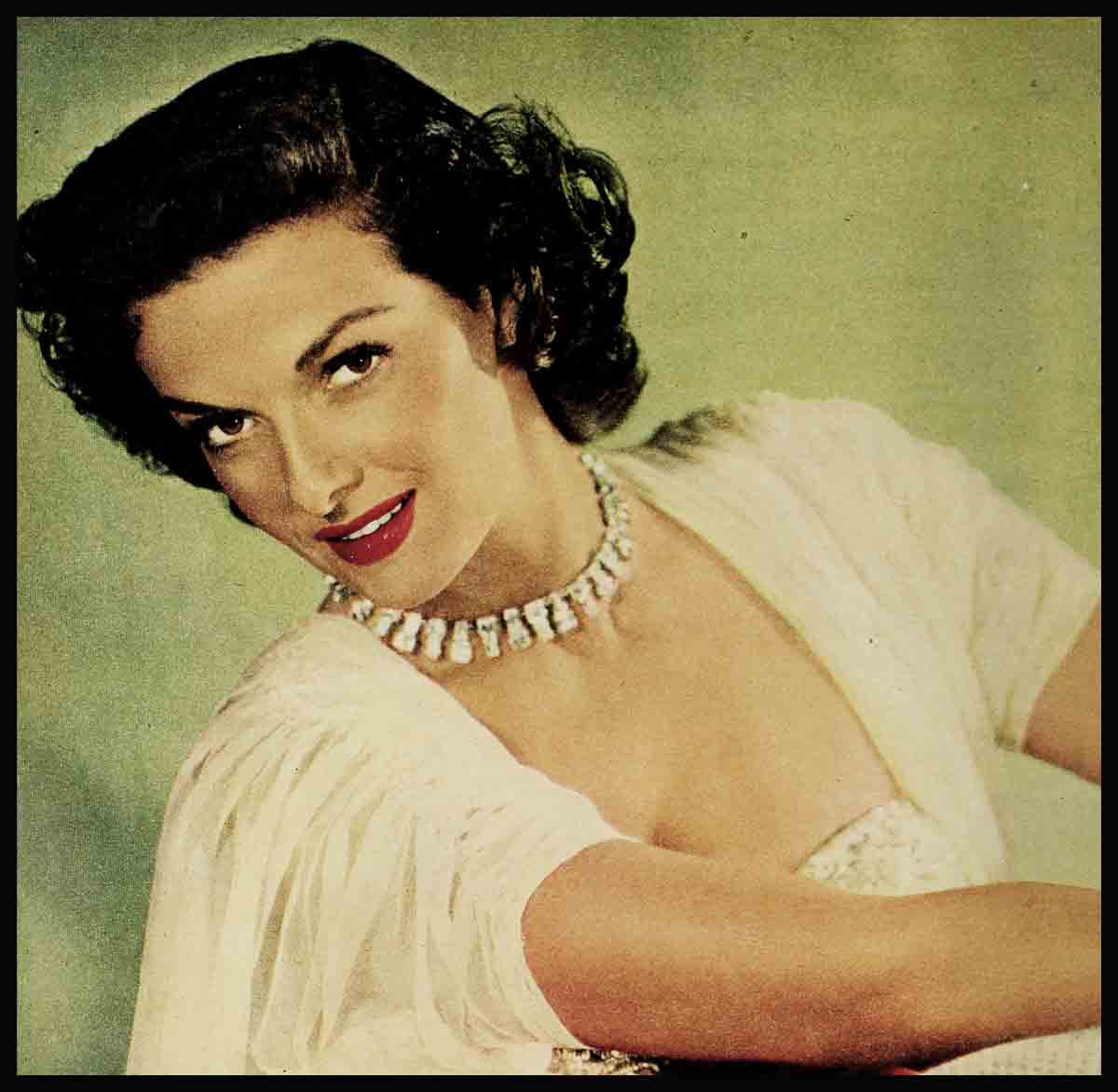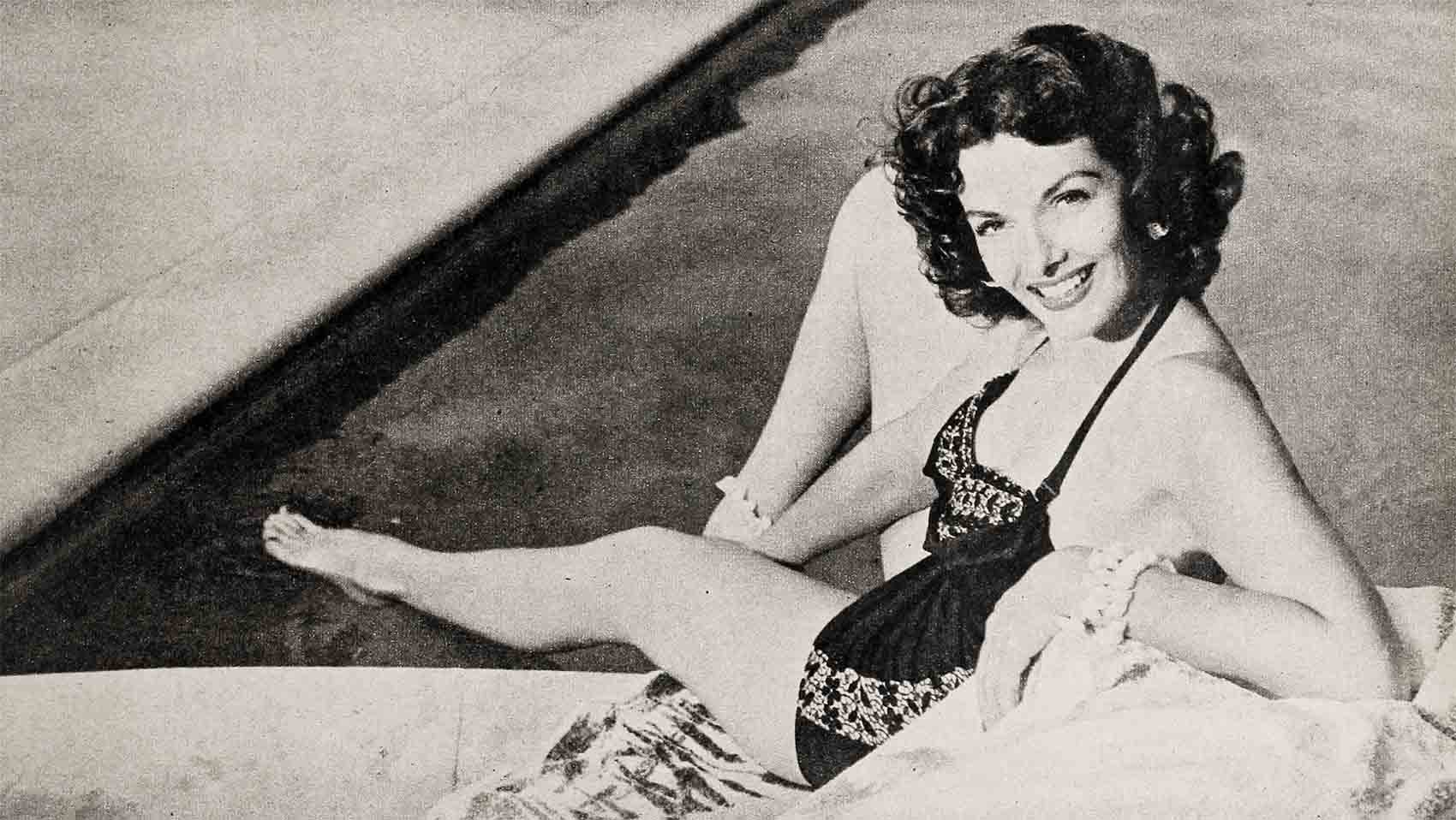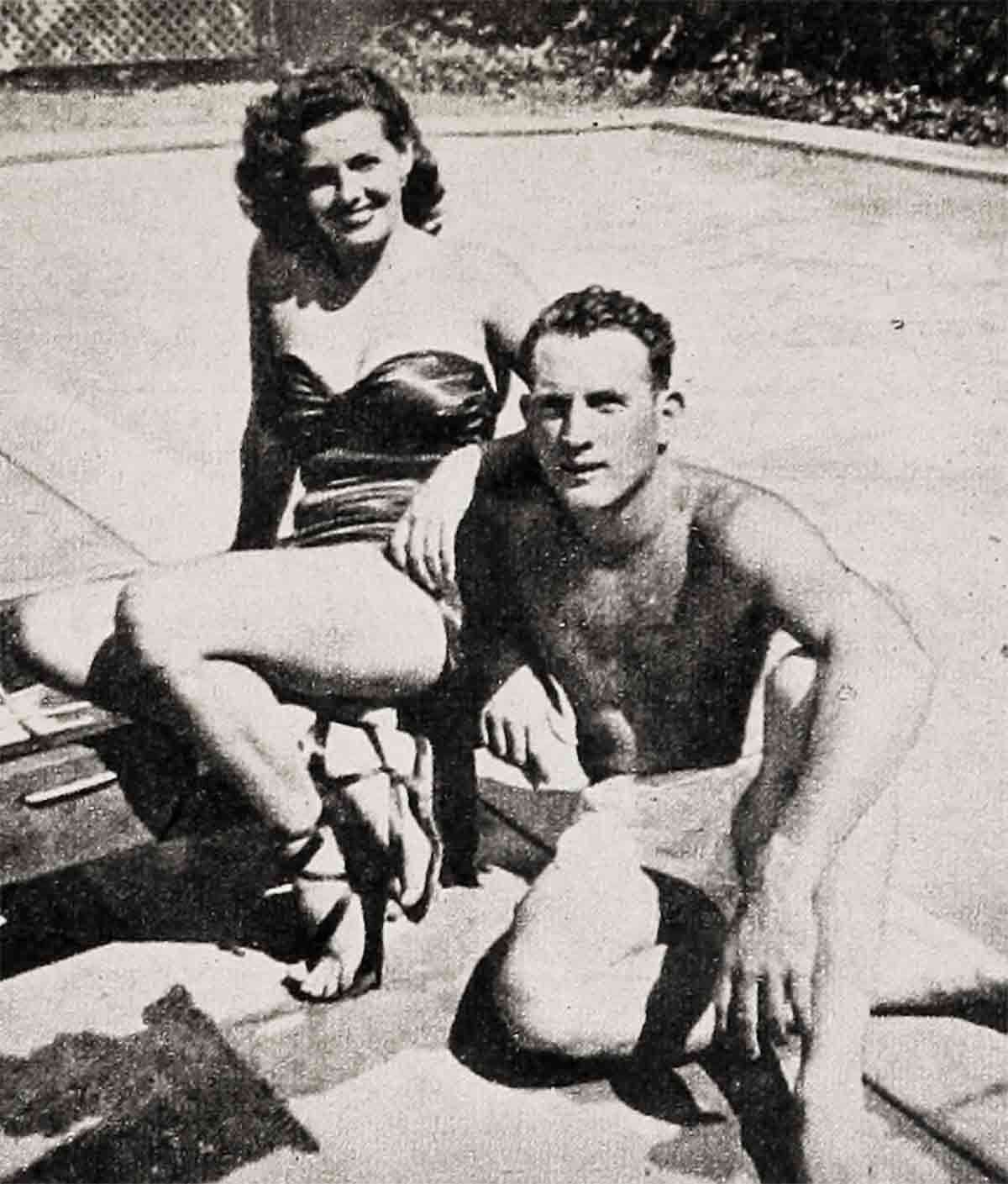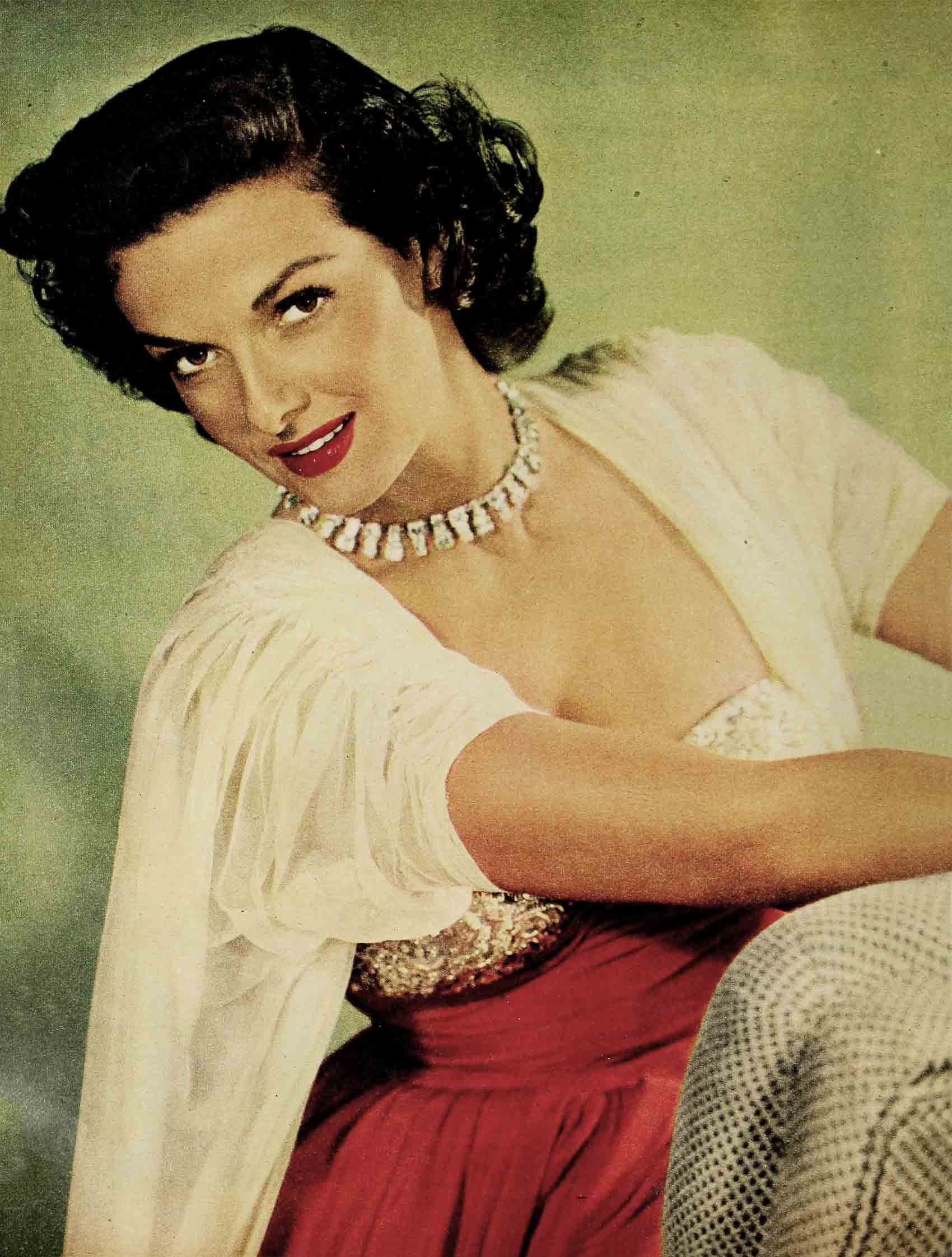
Catch Me Cookin’!—Jane Russell
Editors usually send men to interview Jane Russell. Naturally, they like to give the boys a break. But this time MODERN SCREEN sent me. “You’ve never met Russell? Good. We’d like to know how she impresses another woman. And while you’re at it,” they said, their eyes gleaming, “find out how she keeps that sex appeal routine rolling along with the years.”
“The years” alluded to the ten that have gone by since The Outlaw was released. With the splash of billboard advertising for that film, Jane Russell’s name became familiar throughout America.
Whether or not people saw the picture, they were actually aware that Miss Russell was the new queen of sex appeal. Hollywood sweater girls come and go. The turnover is so rapid that most of them barely get accustomed to their claim to fame before a new doll steps into the spotlight and sweeps away her predecessor. This didn’t happen to Jane. Through the years she has remained the epitome of the lusty bustline, maintaining a reputation that has defied competition. When she landed opposite Marilyn Monroe in Gentlemen Prefer Blondes, Jane not only held her own, but in many cases copped the better reviews.
As a matter of fact, critics on the whole seemed slightly dazed by the fact that Miss Russell, after all these years of hullabaloo, gave a solid performance marked by a definite talent for comedy. “And,” Hollywood screamed in delight, “she can sing! She can even dance!” So they put her in a picture called French Line, in which Russell digs deep into the talent she’s had all along and comes up with a performance that runs the gamut and will again snap heads to attention. She has been a myth in America for a long time and has finally come into her own.
Jane Russell doesn’t look like the girl next door. She looks like a movie star. I don’t mean that she sashays into a cafe dripping with diamonds and mowing down headwaiters. The day of our interview she wore a black velvet vest over a red silk blouse opened at the neck, and matador pants with some kind of gold print. But you don’t pay too much attention to her clothes because the first thing you look at (if you’re woman) is Jane’s face. In repose it is aloof, giving a split second impression that this is a haughty creature. The illusion is dispelled the minute she speaks, and then her face is saucy and friendly and filled with humor. The contrast makes it an interesting face, but the most fascinating thing about it is the smolder. That’s the only word for it—a kind of smolder that comes from the eyes, tip-tilted and dark amber in color, that seem to reflect an inner fire. This face has done more than its share in giving Jane Russell her long-standing reputation.

“What about this sex-appeal business?”
She threw up her hands. “I’ve had it for ten years,” she said. “It can be overdone. It’s like—well, it’s like too much of one thing. You’ve got to have something else. I think a person who has nothing but sex appeal might as well drop dead.
“Maybe I’m just resigned to it by now. I get awfully sick of it—and of those awful Jane Russell jokes—but I have to remind myself, where would I be without it? No place, probably. So I go along with it.” Still, she isn’t the kind of star one photographs in an apron.
She laughed. “I’m never in the kitchen. And even if I did slave over a hot stove I wouldn’t want to talk about it. Me, I’m just as big a fan as anybody else, and I don’t like to know about my favorite movie star’s talents with mixing spoons, or how much starch she puts in her old man’s shirts. You couldn’t catch me in the kitchen if you tried.”
“Do you want to kill the legend of Jane Russell?”
“I guess you can’t kill it. I don’t think I’d want to, not entirely. But I want to do something besides curl my lip and slither.”
“You’ve already done it. I should think you’d consider Gentlemen Prefer Blondes a milestone, because in it you proved you can handle comedy. And now they’ve given you French Line, which ought to prove even more to a lot of doubting Thomases.”
“It was a milestone,” she said. “For years I’ve wanted to do a musical comedy, and from now on it looks as though I’ll get my wish.”
“Is that all you want to do? Musical comedy, I mean?”
She picked up a fork and banged it on the table with the exuberance for which she is famous. “I want to do everything! Musicals—comedy—tragedy—”
“Tragedy?”
“Sure!” She laughed. “I probably can’t do it, but I want to try. I was reading yesterday about another actress and the writer said she was smart because she knows her limitations. I don’t! I’ll tackle anything to find out if I can do it, even if I fall flat on my face.”
“Have you noticed any difference in other people’s attitude toward you since Gentlemen Prefer Blondes?”
“Lots. The mail is a lot heavier. And people keep coming up to me and saying, ‘Gee, Jane, I didn’t know you could sing! Gee, you can carry a tune!’ And you know something? All this back-slapping comes a little too late to please me. I’ve known I could sing since I was in high school, but nobody would give me a chance to prove it. By the time people have found out about it, I’m ready to make another move. Do a Camille, or something like that. If people compliment me on something I don’t know I can do, I curl up in appreciation. But that doesn’t go for this amazement at my singing. Singing’s old hat with me, and I’m not even gracious when people mention it.”

Asked if she’d always wanted to be an actress, she shook her head. “Nope. Because my mother was an actress. When I was in high school I came near to flunking anything that bordered on mathematics, but I got top grades in art and music and drama. So I thought I’d do one of those three. I picked on designing and started three different times to designing school but always ended up going to a dramatics school with some buddy of mine.” She grinned. “I don’t say I learned anything in dramatics classes. It was just the line of least resistance, and okay as long as Mother wasn’t pushing me into it.
“I guess I was doomed for it, though. I used to raid Mother’s old trunks full of show clothes and dress up in all those silks and satins. I even put make-up on my brothers and draped them in all that stuff and we’d give shows in the back yard.”
There is one question I consider a clincher; its answer can tell a lot about a girl. “As a rule, do you like other women?”
“Sure, I like ’em. I think women are real great—I have a lot of friends. Some, though—you know the type—” Here she grimaced. “The kind that drop broad A’s when they didn’t grow up with them, the kind that put on airs and are real grand and call me ‘Miss Russell.’ I’m not Miss Russell to anybody. I’m just old Jane.”
As I went on talking with her I found out a lot about this girl whose name has become.a household word. I learned that Jane Russell says what she thinks and has about as much subterfuge as a mirror. She is uncontrollably honest. If she likes someone they sense it immediately, but if she dislikes a person she can shed them before they are aware of the great void. She has little conceit. When asked if she is easily recognized she said, “Only when I look like the devil and am trying to scuttle from one place to another without being seen. When I’m dressed up, they think I’m somebody else.”
In clothes she prefers opposite extremes, loving slacks or shorts around the house, but favoring the exotic when she puts on glad rags. “When I dress up, it’s got to be the end. Then I’m still in my mother’s trunk.”
The decor of her house stems from Jane’s vivid imagination, and here again her taste leans toward the exotic. Her bedroom is sparked by a headboard and tables in an old Chinese pattern of silver leaf. The walls are mauve, there is an immense couch in deep purple, and the cushions are assorted colors which Jane terms ‘strange.’ It is a job, done entirely by herself, that is admired by professional decorators, and Jane says she will turn to decorating if the day ever comes when she leaves the movie industry. “This is a house,” she says, “that looks as though I should go dripping through it in gold lamé and a long cigarette holder. But I don’t. It’s blue jeans for me.”
She admires feminine women, and periodically determines that she will surround herself in a cloud of trailing chiffon and perfume, but somehow there is never time. She adores perfume, but keeps forgetting to use it, and the weeks stretch into years without her buying that chest full of lacy lingerie she has promised herself. Beauty salons? “They take too much time. You have to get gussied up to go to them and drive there and: back. So I do my hair and nails myself unless I’m working in a picture. Then the studio takes care of these things for me.”

Jane Russell has been known for some time around Hollywood as a character. She is dimly aware that such is her reputation, but does not comprehend the reason for it. The reason is that Jane’s personality is refreshing; she is honest and direct in everything she does. She says what she believes, does what she feels like doing, without giving a thought to the consequences. She moves fast, with a characteristic forcefulness. The saying goes that if you are behind a door when Russell makes an entrance, you will be knocked flat by the door when she bursts in. She enjoys an occasional tantrum, not because she wants to hurt anyone, but because she likes to hear herself howl. There isn’t a drop of malice in Russell, and if anyone is ever cut by her she is completely unaware of it. There was once a new publicist assigned to one of her pictures—we’ll call him Jim Jones. He was ready and willing to work with Russell, but it so happened that every time he got near her she went barrelling off in another direction. After a few weeks of this, during which Jim Jones was growing an ulcer and barking at his wife and children, someone broached the subject to Jane. “I wish you’d be nicer to Jim Jones,” they said.
Jane’s eyes opened wide. “Who is Jim Jones?” she said.
She is unconscious of time or space, with resulting confusion. She never wears a watch, figuring that somebody else can tell her the time. Once she agrees to do something she can be depended upon to do it. This is accomplished by her informing everyone—her husband, her mother, her Japanese houseman and the studio personnel—of the appointment. Russell herself would never think of keeping an engagement book.
Hers is a one-track mind that concentrates on the job of the moment, while everything else flies out the window. It is the mind of a creative person who cannot be bothered by details, and in many ways she is like the proverbial absent-minded professor. She will tackle any chore with every confidence that she will accomplish it. This, despite repeated proof that her stamina is not sufficient for constant physical strain. She wakens in the morning like a bronco released from a chute and goes through her day like a whirlwind until she suddenly collapses. Production of her last two pictures has been held up because of a brief illness, yet she is anxious to do musical comedies. This type of movie requires twice as much work as the straight drama, with long weeks of song and dance rehearsals. Is Jane aware of this? “Sure, but I’ll do it anyway. Just give me a week in the middle of the picture to break down, and I’ll be okay.”
She once went on a fox hunt in Georgia, replete with red coat and bowler hat, despite the fact she had never been on an English saddle in her life. “They asked me if I could ride, and I said sure I could ride. I’d grown up with horses in the west, I told them. So I got up on this thing that was no bigger than a service plate.”
She is the same way with all sports—determined and filled with drive. “I like the hammy kind of sports, the kind of games I can get into myself. Football? Well, I live with football, of course, and there’s a kind of psychological security that goes with it for me. I’m interested in the Rams of course, or whenever Robert plays, but I wouldn’t walk across the street to see a game if I didn’t know anything about the teams. In other words, I can’t play football, so I leave it alone. I like tennis and swimming and skiing because I can dig in myself. But there’s never enough time for these things.”
There’s never enough time because Jane Russell can’t say no. If she’s asked to appear at a benefit, pin up a hem for a friend or model for charity, she can’t refuse. Chaos is the result, with days jammed to the hilt with things to do. Between French Line and Jane’s next movie, she called up a friend and screamed, “I’m getting sore! I don’t understand it, but I’m busier between pictures than I am when I’m making one! And I’m not going to do anything more! I’m gonna rest!” This resolution lasted until somebody asked her to help hang some new paintings.
She is an inveterate pill taker, not because she needs them but simply because she can’t stand to see anybody else take a pill and leave her out of the act. A friend once swallowed an aspirin reinforced with codeine, and Jane held out a hand automatically. “Give me one.”
“They’re pretty strong,” cautioned her friend. “They have codeine in them.”
Jane waved a hand in disgust. “I don’t care what they’ve got. Give me one!” And a half hour later she almost passed out.
She and husband Bob Waterfield don’t travel much. Once in a while there’s a jaunt to New York, where Jane joins Bob in seeing a few football games. The rest of the time they go their separate ways. She likes to swim—swimming isn’t good for football muscles. He likes to hunt—she can’t bear to shoot a deer. She likes New York shows—Bob can’t stand New York or shows. He likes basketball—she can’t play so she doesn’t go. “It’s a good thing,” she says, “that opposites attract. Robert and I have little in common when it comes to hobbies, so it’s sort of to each his own. Home is our center, with the kids—and we’re nuts about the house—and this is our real life together. We’re not really happy unless we’re at home.”
So when they’re in New York Bob goes off on a hunting trip with other men, or to play golf with other men, or to see a basketball game with other men. And Jane goes to shows, gussied to the teeth every night while in New York. Afterward she gathers a group of cronies and goes to the rathskeller bistros of Manhattan where the top jazz musicians jam into the wee hours. Russell can sit for hours in these smoky dens, paralyzed with happiness at the moan and blare of Dixieland and bop. Aware that her energy depends on at least eight hours of sleep, she anxiously consults somebody else’s watch about eleven P.M. “Let’s see,” she says, counting on her fingers to compute the hours, “appointment for lunch tomorrow—whee—I don’t have to go to bed until three A.M.!” And some of her cronies sigh in their beer.
Jane gets very positive ideas, not all of which make sense. Such as her refusal to fly on a night flight. “I can’t sleep on a plane,” she announces. “A night flight makes me lose my sleep.” So she always leaves California at eight in the morning, and the minute she lands in her seat makes preparations that have become ritual. She takes off her shoes, puts on an eye shade, plugs her ears, wraps a blanket around herself and, wearing slacks, curls up in the seat. “Wake me when we get to Chicago,” she tells her companion, and then knocks off for eight hours. The stewardess comes and goes with trays of food, but Russell sleeps on. Stewardesses invariably assume that the lump under the blanket is airsick, and they pass by in clucking sympathy, never knowing that the bundle is only Russell, who claims she can’t sleep on a plane.
These are the things she does that build her reputation as a character, but she is blithely unaware that she does anything differently from other people. She is an avid fan of show business celebrities, and when she appeared on Talullah Bankhead’s Big Show, was wildly happy that she could observe at close quarters such people as Bankhead, Oscar Levant, Toni Arden, etc. It never occurred to her that they might be interested in her.
The fact that a fan mail service in Hollywood reports Jane Russell’s mail now ranks second in the long list of Hollywood personalities helps prove that Jane has at last arrived. There has been a long interim between The Outlaw and this arrival, a period during which Jane felt she was coasting. “I was waiting for the chance to spring,” she says with a laugh. She is kidding when she says it, but it is the nearest Jane Russell comes to blowing her own horn. She has been quiet about it, but she has known all along that she could turn out a professional job that would fuse the myth of her name and the reality of her personality into one.
There are some who claim that Russell’s drive, her force and her personality have only begun to be tapped for the screen. They say she has greater potential than most.people realize, and that given the opportunity, she can become a truly great personality in the entertainment world. Certainly, Jane Russell has more than sex appeal and a reputation for being a character. She is a great dame.
THE END
—BY JANE WILKIE
It is a quote. MODERN SCREEN MAGAZINE FEBRUARY 1954




